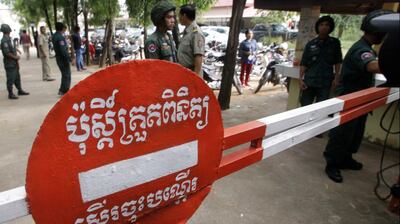Family members and human rights officials have called on Cambodia’s government to probe the use of cellphone jamming devices in prison cells they believe are impacting the health and rights of detainees after jailed activists complained of what they say is radiation poisoning.
Eap Sour, the wife of opposition Cambodia National Rescue Party (CNRP) activist Kong Sam An, told RFA’s Khmer Service Wednesday that her husband was shockingly thin, irritated, and forgetful while appearing at the Phnom Penh Municipal Court last week to face charges of “incitement.”
She said Kong Sam An, like other detainees, complained that his health was deteriorating and that he had passed out in his cramped cell in Phnom Penh’s notorious Prey Sar Prison because of the jamming devices.
“He looked like he was going to faint during the hearing, and I wanted to cry,” she said.
“I'm disappointed that good people like him are treated badly by the authorities. He fought for the nation, worked as a teacher, and eventually ended up in prison. I feel sorry for him, but I can do nothing but pray for him to get well soon and return home.”
Prey Sar Prison is the largest of Cambodia’s prisons and administered by the country’s Ministry of Interior. Rights groups say conditions in the facility, formerly known as S24, are atrocious.
According to London-based Amnesty International, as of January last year, Prey Sar held over 10,000 prisoners, approximately 500 percent over capacity. Up to 40 percent of all prisoners are in pre-trial detention and thousands are held for minor, non-violent offenses, such as use or possession of drugs.
Kol Sat, the wife of jailed CNRP activist Kong Mas, told RFA that while the prison’s water supply was recently restored, inmates remain stacked like farm animals.
She urged the government or the Ministry of Interior to investigate the cellphone jamming devices and remove them if they are found to have a detrimental effect on the health of the detainees.
“I had a quick chat with [Kong Mas], but he could not hear the conversation and kept forgetting things,” she said.
Several activists, including Cambodian Confederation of Trade Unions president Rong Chhun, who are being tried on charges widely seen as politically motivated, have also complained of Prey Sar’s tight quarters and said they believe the cellphone jamming devices have impacted their health and memory.
Former prisoner Kong Raya said that each cell in Prey Sar has at least four or five devices. He said the devices make a noise that bothered his ears and gave him a headache.
Instead of installing the devices, he added, prison guards should be fighting corruption within their ranks and stopping prisoners from having cell phones brought into the facility.
“I’m no expert, but prisoners—including political activists—have the same complaints,” he said.
“When they were outside, they were fine, but when they are in jail, they lose their memory.”

Call for probe
In response to the complaints, Nuth Savna, the spokesperson for the Ministry of Interior's General Department of Prisons, said he welcomed the idea of setting up a commission to investigate the impact of using the devices, as his officers work at Prey Sar. He claimed that the company that installed the devices had previously confirmed that they are not harmful.
“Please be informed that my officers lack the skills to evaluate radio equipment, so only a telecommunications employee can do it,” he said.
“This request has nothing to do with me. If civil society writes a letter to the government or the Ministry of Interior, they will decide whether to take action.”
Nuth Savna said prison officials restrict the import of prohibited items, but crowded conditions prevent them from catching all contraband. As for the overcrowding, he echoed earlier statements claiming that the courts are working to speed up their caseload and authorities are building more prisons.
Am Sam Ath, deputy director for human rights monitoring and protection at local rights group LICADHO, confirmed to RFA that many detainees have made similar claims about the health effects of the cellphone jamming devices, but that so far, no one has probed the issue.
He called on the government to establish an expert and independent commission to investigate and address the allegations.
“We are not experts, we do not dare to explain whether they have an affect or not, so we want an expert committee to study the matter,” he said.
He added that even though detainees are deprived of certain rights in prison, they should still enjoy the rights to adequate food, health services, and freedom from torture.
‘Inhumane’ conditions
Cambodia’s opposition parties have also called on Cambodian authorities to improve conditions for the country’s detainees.
The CNRP’s European Union branch earlier this month issued a statement urging Cambodia’s government to resolve overcrowding and end the use of jamming devices in prisons.
The EU branch said it considers the housing of thousands of prisoners together in cramped, poorly ventilated rooms, “torture” and “a serious human rights violation.”
In November 2017 the Supreme Court banned the CNRP for its supposed role in a plot to overthrow the government. The move marked the beginning of a wider crackdown by Prime Minister Hun Sen on the political opposition, NGOs, and the independent media that paved the way for his ruling Cambodian People’s Party (CPP) to win all 125 seats in the country’s July 2018 general election.
In March last year, Amnesty International’s regional director, Nicholas Bequelin, called the conditions in Cambodia’s jails “inhumane,” adding that detainees and staff are unable to take preventable steps, including physical distancing and isolation during the coronavirus pandemic.
“These conditions were never acceptable, and now they risk lighting a fuse for what could quickly become dramatic and exponential levels of community transmission of COVID-19,” he said, referring to the disease caused by the virus.
Reported by RFA’s Khmer Service. Translated by Samean Yun. Written in English by Joshua Lipes.
